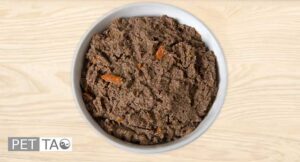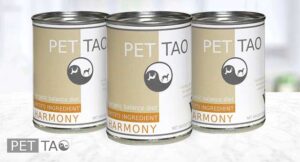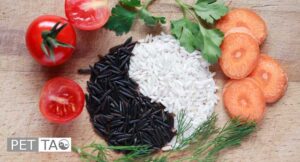What Is a Limited Ingredient Dog Food?

A limited-ingredient diet simplifies the dog’s food to reduce the potential for allergies, sensitivities, or digestive issues.
Typically, limited-ingredient dog foods are made with a single source of animal protein (such as turkey, duck, or fish) and a limited selection of easily digestible carbohydrates (such as sweet potatoes or peas).
Limited diets often avoid common allergens like grains (wheat, corn, or soy) and artificial additives (colors, flavors, or preservatives) that can trigger adverse reactions in some dogs.
The ingredient list on limited-ingredient dog food labels is intentionally kept short and straightforward, allowing pet owners to quickly identify and eliminate potential allergens or irritants.
This simplification can help pet owners determine the specific ingredient(s) causing an adverse reaction in their dog, making it easier to manage their dietary needs.
Limited ingredient dog foods are available in dry kibble and wet canned varieties, providing options for different feeding preferences and dietary requirements.
Not all limited-ingredient dog foods are the same, so it’s crucial to carefully read the labels and choose a high-quality brand that meets your dog’s specific needs.
Western Veterinary Reasons for Feeding a Limited Ingredient Dog Food
There are several Western veterinary reasons why a dog might need a limited ingredient dog food:
- Food allergies or sensitivities: Dogs, like humans, can develop allergies or sensitivities to certain ingredients in their food. Common dog allergens include grains (such as wheat, corn, or soy), specific proteins (such as beef or chicken), or artificial additives. Limited ingredient dog foods are formulated with few ingredients, making identifying and avoiding potential allergens easier.
Digestive issues: Some dogs have sensitive stomachs or digestive disorders, such as irritable bowel syndrome or food intolerances. A limited-ingredient diet can help reduce the likelihood of triggering digestive upset by eliminating potential irritants and focusing on easily digestible ingredients.
- Dietary exclusions: Sometimes, a veterinarian may recommend a limited-ingredient diet to address specific health conditions. For example, dogs with kidney disease may require a low-protein diet, and those with pancreatitis might benefit from a low-fat diet. Limited-ingredient dog foods can be tailored to meet these dietary restrictions while providing essential nutrition.
- Elimination diet trials: When a dog is experiencing unexplained symptoms like chronic itching, gastrointestinal issues, or skin irritations, an elimination diet may be conducted to identify potential food allergies or sensitivities. Limited-ingredient dog food can be used during this trial period, as it contains a simplified and restricted ingredient list, making it easier to pinpoint problematic ingredients.
It’s important to note that if you suspect your dog has specific dietary needs, it’s always best to consult a veterinarian. They can help determine whether a limited-ingredient dog food is appropriate and which ingredients to avoid or include in your dog’s diet.
Traditional Chinese Veterinary Medicine Reasons for Feeding a Limited Ingredient Dog Food
Traditional Chinese Veterinary Medicine (TCVM) is a holistic approach to animal health that incorporates various modalities, including acupuncture, herbal medicine, and dietary therapy.
While TCVM does not explicitly advocate for limited-ingredient dog foods, it focuses on balancing the body’s energy and addressing underlying imbalances to promote overall health and wellness.
However, certain principles of TCVM are relevant to feeding limited-ingredient dog food.
Reasons from a TCVM perspective include:
Yin-Yang balance: TCVM emphasizes the concept of Yin and Yang, opposing forces that must be balanced for optimal health. In some cases, certain ingredients commonly found in traditional dog foods (such as grains or specific proteins) may be considered energetically imbalanced, potentially disrupting the Yin-Yang equilibrium. Limited ingredient diets may be recommended to give your dog more balanced and harmonious energy.
- Food energetics: TCVM considers the energetic properties of foods and their effects on the body. Some dogs may be more sensitive to certain ingredients with a specific energetic quality. For example, certain proteins may be considered warming or cooling in nature, and an imbalance in the body’s energy may benefit from avoiding or including specific ingredients.
- Individualized approach: TCVM emphasizes the importance of individualized treatment plans based on each animal’s unique constitution and specific health concerns. For example, a limited-ingredient diet may be recommended if your dog has been diagnosed with a particular condition or imbalance that could potentially be addressed through dietary adjustments.
TCVM is a complex system that requires expertise and knowledge to apply correctly.
If you’re interested in exploring TCVM principles for your dog’s diet, we recommend consulting with a TCVM-trained veterinarian.
They can provide personalized guidance based on a comprehensive assessment of your dog’s health and individual needs.
PET | TAO Harmony Limited Ingredient Dog Food

Limited Ingredient Harmony is formulated with cooling ingredients to help neutralize excess heat in specific organs.
Our vets find PET | TAO Harmony Limited Ingredient Dog Food particularly helpful with many chronic health challenges.
Some examples are:
- Skin issues: Dogs with food allergies or sensitivities often exhibit symptoms related to their skin. This can include itching, excessive scratching, redness, rashes, hot spots, or recurring ear infections. By eliminating potential allergens, a limited-ingredient diet helps reduce skin inflammation and improve skin health.
- Digestive problems: Dogs with sensitive stomachs or gastrointestinal disorders may experience symptoms such as chronic diarrhea, vomiting, flatulence, or bloating. A limited-ingredient diet can provide easily digestible ingredients and exclude common irritants, helping to soothe the digestive system and reduce gastrointestinal disturbances.
- Chronic ear infections: Recurring ear infections in dogs can sometimes be associated with food allergies or sensitivities. A limited-ingredient diet can help reduce inflammation and minimize the frequency or severity of ear infections by eliminating potential allergens.
- Gastrointestinal upset: Dogs with food intolerances or sensitivities may experience frequent gastrointestinal upset, such as loose stools, regular bowel movements, or irregularity. A limited-ingredient diet can help identify and avoid the specific ingredients that trigger these issues, promoting better digestive health.
- Chronic inflammation: Some dogs may be predisposed to inflammation, which can manifest as joint pain, stiffness, or general discomfort. Limited-ingredient diets focusing on anti-inflammatory ingredients, such as omega-3 fatty acids or novel protein sources, may help reduce systemic inflammation and provide relief.
Of course, diet alone often doesn’t eliminate the health challenge. They often use the limited ingredient diet with TCVM herbs, acupuncture, and other modalities.
What Are The Ingredients in PET | TAO Harmony Limited Ingredient Dog Food?
Our veterinarians created PET | TAO Harmony Limited Ingredient Dog Food using all-natural ingredients and Traditional Chinese Medicine food therapy principles.
It is formulated with limited natural ingredients specifically chosen to keep your pet in a state of energetic balance.
The main ingredients are:
- Turkey
- Carrots
- Celery
- Green beans
- Broccoli
- Spinach
Learn More About PET | TAO Harmony Limited Ingredient Dog Food










